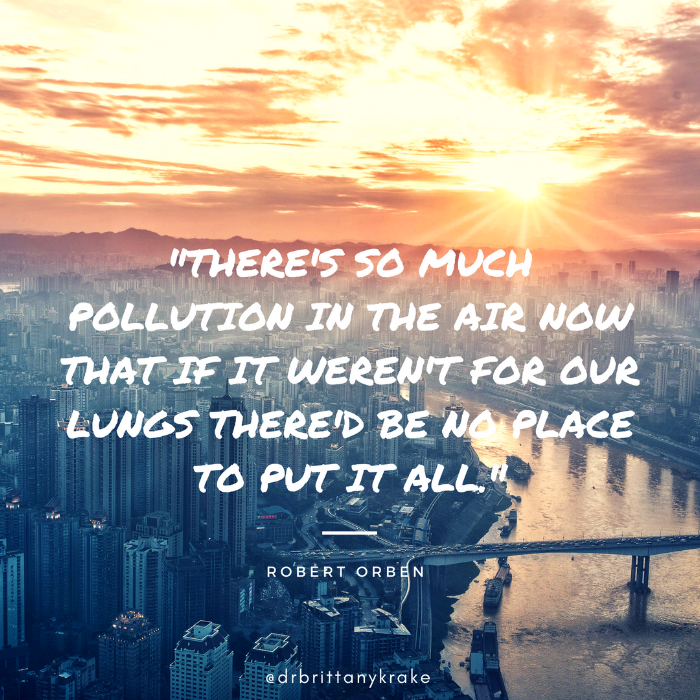Let's Clear the Air: It's Wildfire Season
Photo by The Roaming Platypus via Unsplash
It’s that time of the year when the news is simply a long list of places affected by wildfires and/or poor air quality. Since the stagnant warm weather doesn’t seem to be helping much by way of removing toxins from the air, it’s an opportunity for us to make sure our air hygiene is up to snuff (pun intended).
WHY IS AIR QUALITY SO DANG IMPORTANT?
Our lungs are one of our greatest detoxification organs… So when you are breathing in substances that directly harm the lungs and diminish their function, not only are you increasing your toxic load, but it becomes more difficult to detox out what you breathed in. Certainly you may feel the short-term effects of poor air quality when you get that tickle in your throat, experience eye irritation, or have increased nasal and sinus congestion, but long-term effects tend to be a little more silent and a little more serious. In fact, air pollution has been categorized as one of the top 10 leading dangers resulting in death... worldwide.
I don’t share this to scare you… I share this simply to inspire you to pay attention to your surroundings and engage in simple precautions to decrease the effects of fire and pollution season.
Brief periods of poor air quality may be handled with relative ease by those without lung issues, however, a large portion of the US population may actually be at increased risk of health complications during this time. A few examples of people with greater susceptibility include individuals with:
- Heart disease
- Lung disease, including asthma, allergies, COPD, emphysema, or greater susceptibility to common colds, flu or pneumonia
- Ear, eye, nose and throat conditions
- Chronic inflammatory conditions
- Cancer
- Young or advanced age
- Pregnancy
A FEW MINIMAL TIPS TO IMPROVE YOUR AIR QUALITY
While there isn’t much we can do to immediately improve the air outdoors, there are a few small things that can help keep your air clean indoors!
- If you have an air conditioner, keep it running and keep your fresh air intake closed. If you don’t have A/C, pay attention to the Air Quality Index (AQI) locally, and speak with your doctor to assess if you need to find alternative shelter.
- Clean your air ducts and vents at least once yearly. Install a new filter quarterly (more often if visibly full). I always recommend HEPA filters.
- On days with a low AQI score, use fans to blow air out of your home through an open window.
- Keep your home clean. Now’s your chance to get caught up on that delayed spring-cleaning. Vacuuming, however, stirs up extra dust and particulate and should be avoided on days with a high AQI (poor quality) and when you are unable to open windows and doors.
- Avoid using anything that burns, has fragrance, or is aerosolized, including: candles, incense, perfume, hairspray, matches, wood OR gas stoves and fireplaces, etc. If you are using a gas stove, be sure your ventilation fan is running on high.
- Avoid smoking any substance...entirely. Especially avoid smoking inside your home.
- Do not exercise outdoors with high AQI scores or during times of high pollution (rush hour, for example).
- Unplug and/or turn off appliances when they are not in use. Electricity also contributes to air pollution.
- Add some air-purifying plants to your home. Bill Wolverton, a former NASA research scientist who conducted a study on the effectiveness of plants to improve indoor air quality, generally recommends two plants per 100 square feet.
- Paper masks do not protect you from particulate matter or smoke from wild fires. You will need to find a mask or respirator with a rating of N95 or P100 to block out most particulates.
PREfer A LITTLE EXTRA HELP?
- Download an Air Quality Index app if your phone or computer doesn’t already have one. Set the settings to give you notifications with changes to air quality.
- If an air purifier is in your budget, it is important to find one that is “true HEPA” or HEPA certified. These will remove the invisible particulates floating around your home.
